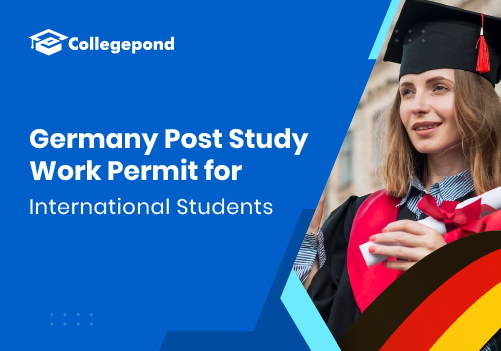
Next Steps After Graduation in Germany: Securing the German Post-Study Work Permit
A comprehensive guide to securing a German post-study work permit for international students seeking to make a thriving career.
Germany over the years had gained immense popularity amongst international students as a destination to pursue their undergraduate or postgraduate studies. Apart from having a high-quality educational system, Germany also is also recognized as the largest economy in Europe, which thus makes it one the most sought-after countries for having a career. Over and above, the high standard of living, a rich culture, mesmerizing natural beauty, a safe and healthy environment, stunning architecture, work visa benefits etc., are some other factors that motivate students to continue their life in Germany.
Germany offers a plethora of career options for students to choose from, the job most suitable to them and their qualifications, as there is a huge demand for technically skilled employees across all industries such as automobiles, pharmaceuticals, business, commerce, etc.
Here are some facts that make Germany a very attractive destination for international students when it comes to making a career:
✔ The German IT sector is nearly $120 billion and is expected to clock a CAGR of 3.08% from 2022-2026 with presence of several blue-chip companies such as SAP, Siemens, Deutsche Telekom among others.
✔ The Engineering sector of Germany has been very well-known for decades, and global behemoths such as Volkswagen, BMW, and Bosch that are headquartered in Germany are most preferred employers for students in mechanical, electrical, or civil engineering.
✔ Germany is the largest economy in Europe, and its financial and banking sector is highly developed. International students with degrees in finance, accounting, or economics can find numerous job opportunities in this sector.
✔ With an aging population, Germany has a growing demand for healthcare professionals. International students with degrees in medicine, nursing, or other related fields can find employment in hospitals, clinics, and other healthcare facilities.
✔ Germany is one of the most enthusiastic countries when it comes to renewable energy. Renewables were estimated to have covered nearly 46% of the country’s power consumption in 2022. Thus, what is a sunrise industry in most other countries is already a well-developed one in Germany, and students who wish to make a mark in this futuristic sector would love to secure employment here.
However, first, you must have a Post Study Work Permit, in order to be able to live and work in Germany. Students who have completed their studies at German universities are eligible to apply for a Post Study Work Visa. In addition, there are various work permit eligibility that students must fulfill.
All that you need to know about studying in Germany.
There are a number of Post Study Work Permits based on the needs of various immigrants. You can choose the ones you are eligible for and the one which suits your needs. The following are the post study work visa types that you can explore depending on what is applicable to you:
1. Temporary/ Limited Residence Permit
As soon as you have finished your studies at the university, your student visa will expire, and so you will need to apply for an extension to your residence visa, for the purpose of finding employment. This is known as the Temporary/ Limited Residence Permit. It is an 18-month extension period that begins upon the completion of your studies. During this extended period, you can start searching for full-time jobs, suitable to you and your qualifications. You can apply for this document at the foreign national registration office in your area. You are required to show:
1. Personal ID and passport
2. Proof of successful completion of your degree/course at the German University.
3. Proof of your Health Insurance Coverage.
4. Proof of sufficient financial means to cover your cost of living, till you find a permanent job.
2. Job Seeker Visa
For students who have returned to their home countries upon completion of their studies in Germany, but plan to return and have a career in Germany, there is the Job Seeker Visa. It is another temporary visa, which is valid for a period of 6 months, during which you can seek the job most suitable to you and your qualifications. As it is a temporary visa and not a permanent work permit, you must apply for a separate work and residence permit as soon as you find your permanent job.
3. Residence Visa
Once you have bagged your permanent job, you are eligible to apply for your residence visa. You may apply for a Residence Visa (also temporary in nature) for taking up employment and starting work. You may choose to either apply for a German Residence Permit or for an EU Blue Card. If you wish to stay in Germany for a longer period of time, the German Residence Permit is more suitable. This visa is valid for the exact period stipulated by your employment contract. Nevertheless, it can be renewed from time to time, depending on your employment status. On the other hand, there is the EU Blue Card, which allows you (a non-EU person) to stay and take up employment, not only in Germany but also in 25 other EU countries. However, a student from an IT or STEM (Science, Technology, Engineering, Mathematics) background is more likely to secure the EU Blue Card.
To apply for this visa, you will need to fulfill the following work visa requirements:
1. Your university degree or equivalent document.
2. Proof of Health Insurance Coverage.
3. Your employment contract at the German company, stating your contract period and your salary, which should cover your cost of living in Germany.
4. EU Blue Card holders are required to have a minimum gross annual salary of 43,056 EUR to 55,200 EUR.
4. Temporary Residence Visa for Self-Employment
You can apply for a Temporary Residence Visa for Self-Employment as well. Once you graduate from a German University, you may even choose to work as a freelancer or set up your own business. For certain regulated professions, such as medicine, you need to have the required qualifications and certifications to follow the skill as a profession. Initially, this permit is granted for a period of 3 years. Once your business earns an adequate amount of profit, you may extend your permit for a longer period of time. For applying for this permit, you are required to provide:
1. A relevant experience in the business/profession.
2. A proper business proposal.
3. Proof of personal finances or bank loans to fund the business.
Collegepond MS Counselling Services: Your complete solution to Study MS Abroad
Documents Required to Apply for Post-Study Work Permit in Germany
Below is a list of documents you essentially are required to submit for the applications:
1. 2 completed and printed application forms for Post Study Work Permit.
2. 2 current passport-size photos of yourself.
3. Valid National passport with minimum 6 months validity remaining beyond your application date .
4. Proof of residence.
5. Contract of Employment: You will need a written job offer from a German employer, which should include details of the position, salary, and duration of the contract.
6. Proof of qualification: You must be able to provide evidence of your qualifications, such as your degree certificate or transcript, which confirms that you have completed your studies in Germany.
7. Curriculum Vitae.
8. Cover Letter which explains your reasons for seeking a Post-Study Work Permit.
9. Document stating clean criminal record .
10. Receipt of Visa Fee payment.
11. Health insurance: You must have valid health insurance coverage in Germany.
12. Financial means: You will need to prove that you have enough funds to support yourself during your job search, such as bank statements or a letter from your sponsor.
To ensure you don’t miss anything, we suggest creating a post graduate work permit checklist for your application.
Post-Study Work Permit Application Process
As we have seen the different types of Post Study Work Visas that Germany offers, we can now move ahead to learn about the Application process for the same. The application process for Visa Application in Germany is comparatively easier than in other European nations.
Application Fee
The application fee is approximately 75 EUR.
Before you begin with the application process, it is important that you have two things in place:
1. An Updated Resume
2. A Cover Letter
The cover letter should cover aspects such as stating the purpose of writing the letter (in this case, it would be to apply for post-study work permit), relevant work experience in Germany or abroad, reasons for wanting to work in Germany, German and other language skills, and how you would be able to contribute to the German workforce.
Once you have the resume and cover letter in place, you may follow the steps below to go ahead with your application process:
1. Receive a job appointment letter from a German company.
2. Select the type and category of visa you require as per your job.
3. Find out where and how you can submit your documents and visa application form, on the websites of the German Immigration Department.
4. Following the instructions there, keep all the required documents handy for the submission.
5. Schedule an appointment at the Immigration office/embassy.
6. Pay the required visa cost for the work visa.
7. Appear for the interview scheduled by them, and wait for their response.
You are required to submit all the documents in-person at the Immigration office/embassy. Once all the required documents are submitted, the application is forwarded to the Aliens’ Authority.
Processing Time
One can expect to obtain their residence permits within a period of 1-3 months, if they follow the process and submit all the documents accurately. After a processing period of 1-3 months, if the application is approved by the Aliens’ Authority, the embassy or consulate will issue a residence permit in the form of a visa.
Duration
The work permit that you will receive will grant you the authorization to work and stay in Germany for 18 months.
FAQs
International students who have completed a degree program at a German university and have a valid student visa are eligible to apply for a post-study work permit. However, students who have completed a language course or a preparatory course are not eligible.
The validity of the post-study work permit is 18 months
Yes, you can apply for a job seeker visa in Germany after graduation. The job seeker visa allows you to stay in Germany for up to 6 months to search for a job related to your field of study.
Yes, it is possible to switch from a post-study work permit to a permanent residence permit in Germany. However, you need to meet certain eligibility criteria, such as having a job and a certain level of income.
No, you do not need to have a job offer to apply for a post-study work permit in Germany. However, you need to show that you have sufficient financial resources to support yourself during your job search.
Yes, you can travel outside of Germany while on a post-study work permit. However, you need to make sure that your visa is valid and that you have the necessary documents for re-entry into Germany.
The processing time for a post-study work permit application varies depending on the workload at the embassy or consulate and can be anywhere between 1-3 months. It is recommended to apply for the permit at least 3 months before the expiration of your student visa to avoid any delays.




